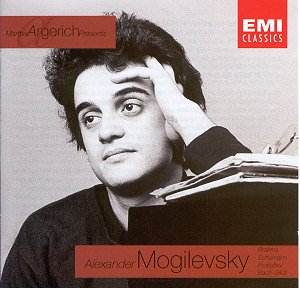Alexander Mogilevsky was born in 1977, won the first
International Tchaikovsky Competition for Young Pianists in 1992 and
has appeared in London, Paris, Amsterdam, Warsaw and a range of other
European musical centres, as well as touring Japan.
The shock when the disc starts with the fourth intermezzo
instead of the second is mild compared to that induced by what Mogilevsky
does with it. I can only describe his Brahms as a catalogue of aberrations.
The opening triplet rhythm is distorted. I’m not being academic, what
he does goes light-years beyond any reasonable rubato and amounts to
re-composition. Note values are lengthened or shortened at will – does
he know there are supposed to be three beats in the bar? –
and sometimes a note is suddenly played so quietly you can strain your
ears and even then not be sure whether he has played it or not. And,
more than once, the "vanishing" note is actually the apex
of a phrase Brahms has marked with a hair-pin crescendo-diminuendo.
If he doesn’t feel like playing notes together he doesn’t, if he feels
like bringing a note out in the middle of the texture for no apparent
reason at all he does so, and he changes tempo with the wildest of liberty.
5 and 6 are no better; the extremely problematical no. 5 completely
falls apart. Just where is the grace Brahms asked for and does the word
not imply some sort of regular movement? Incidentally, the listener
who tries to reconcile Tim Parry’s penetrating observations on no. 5
with the serene no. 6 – is it possible that nobody in the production
line noticed the discrepancy between the pieces listed and those played?
– are in for a perplexing time. This is not Brahms, it is Brahms arr.
Mogilevsky and should have been advertised as such.
Kinderszenen is a notoriously high-risk area
for this sort of treatment and at times it gets it. Here, though, I
must say that Mogilevsky does at least understand that you’ve got to
set up a rhythm before you pull it to smithereens. Most of the pieces
at least start attractively and it must be said that the actual sound
is right for the composer, mellow and singing. The first, for example,
proceeds fairly normally, bar some odd voice-leading, until the repeat
of the second half. But then a devil gets into Mogilevsky and he does
everything possible to disrupt the flow. The last but one, Child
falling asleep is, as a dentist would say, unerupted all round and
we can at last appreciate Mogilevsky’s possible potentialities. This
is all the more a relief coming after a very oddly distorted Frightening.
Heavy weather is made of Traumerei.
I wasn’t unduly enthusiastic about Murray
McLachlan’s Prokofiev in a Brilliant set of all the Prokofiev, Scriabin
and Shostakovich Sonatas, but what balm to return to his honest, unfussy
musicianship after this. At least he unfolds the opening pages of the
7th with shape and a sense of growth. Mogilevsky is not unrhythmical
but his way of stabbing at notes that are not marked to be stabbed at
pulls things out of focus and leaves the impression that he is just
pecking at the surface of the music. In the "Andantino" sections
he goes in for every wilful distortion available, giving the impression
that the music is just drooling nonsense. And how much more mannered
his presentation of the great "Andante caloroso" theme sounds
each time it comes round, really irritating after McLachlan’s simple
nobility, and none too ingratiating in tone quality. At least he doesn’t
tear through the "Precipitato" finale – the tempo is the same
as McLachlan’s. But where McLachlan builds it up cumulatively Mogilevsky
with his jabs and stabs seems to be improvising a boogie-woogie.
The Siloti Bach transcription is a weird and rather
wonderful document. Mogilevsky is sensitive towards its tone-colours.
If only he wouldn’t halt before every change of harmony – it
gets so tiresomely predictable.
I really find it impossible to say whether there might
be pianistic and musical gold under all this dross; at present the aberrations
are too widely and generously applied for any to reach us.
This latest batch of pianoforte debut albums are "presented"
by Martha Argerich, which means she supplies a seven-line general introduction
to the whole series. It would have been interesting to know why
she thought this pianist deserves our attention and she might have defended
him against the adverse reactions that she surely she must have realised
were likely. And whoever is artistically responsible for this series
should have seen that EMI’s reputation is ill served by this disc.
Christopher Howell


